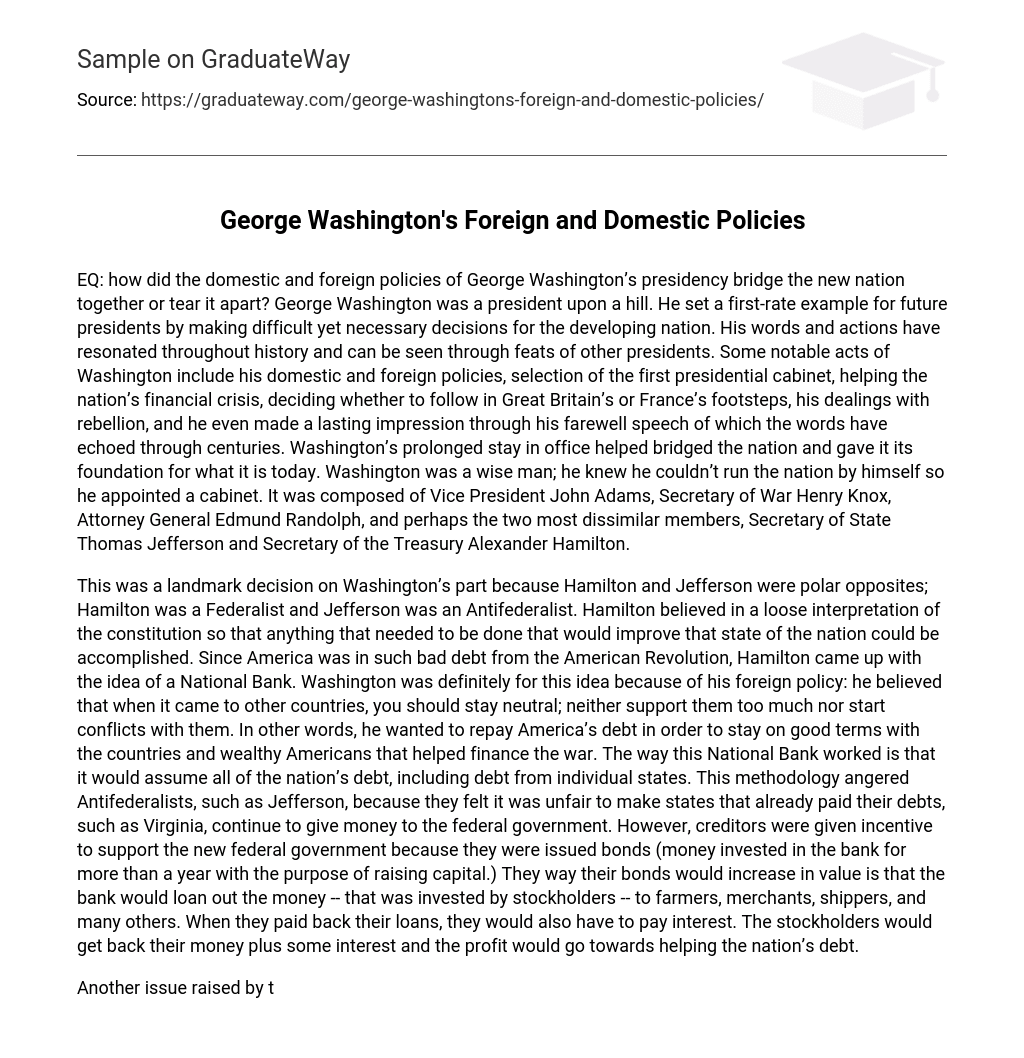Question: Did George Washington’s domestic and foreign policies bring the new nation closer or divide it?
George Washington, positioned as a president on a hill, served as a remarkable role model for future presidents. He navigated the challenges that came with building a new nation by making tough but essential choices. The impact of his words and actions has reverberated across time and is evident in the accomplishments of subsequent presidents.
Washington’s notable accomplishments encompassed various areas. He made significant contributions through his domestic and foreign policies. Additionally, he played a key role in selecting the first presidential cabinet and addressing the nation’s financial crisis. He faced the crucial decision of aligning with either Great Britain or France, and also handled rebellion. Furthermore, his farewell speech left a profound impact that still resonates today.
Washington’s extended time in office played a crucial role in unifying the nation and establishing its current foundation. Recognizing the impossibility of single-handedly governing the country, he formed a cabinet comprising Vice President John Adams, Secretary of War Henry Knox, Attorney General Edmund Randolph, Secretary of State Thomas Jefferson, and Secretary of Treasury Alexander Hamilton – mutually contrasting individuals.
This marked a significant decision for Washington as Hamilton and Jefferson held opposing views. Hamilton, a Federalist, advocated for a broad interpretation of the constitution, allowing necessary actions to improve the nation’s condition. Given the massive debt resulting from the American Revolution, Hamilton proposed establishing a National Bank. Washington endorsed this notion, aiming to maintain neutrality in international affairs by neither excessively supporting nor engaging in conflicts with other countries. Essentially, Washington’s intention was to repay America’s debt to sustain favorable relationships with nations and wealthy individuals who aided in financing the war.
The National Bank’s operation involved assuming all of the nation’s debt, including debt from individual states, which caused discontent among Antifederalists like Jefferson. They believed it was unjust for states that had already settled their debts, such as Virginia, to still contribute funds to the federal government.
However, creditors had a motivation to back the new federal government due to the issuance of bonds. These bonds served as an investment in the bank with the goal of raising capital. The increase in value of these bonds occurred through the lending of money invested by stockholders to various individuals, such as farmers, merchants, and shippers. These borrowers repaid their loans along with interest. As a result, stockholders received their money back with added interest, and the profits aided in the repayment of national debts.
The Jefferson versus Hamilton dispute raised another issue regarding whether America would support Great Britain or France in their war. Hamilton supported England, while Jefferson supported France. Washington, with his opinion on foreign affairs, believed that America should avoid entangling alliances due to the potential risk of other countries’ problems becoming America’s own. Additionally, Washington felt that America was still too weak to involve itself in such disputes. Consequently, Washington served another term in office to prevent Hamilton and Jefferson from tearing the nation apart. Despite this, Washington’s main concern remained the nation’s financial crisis. To generate more revenue, Hamilton suggested implementing an excise tax on whiskey. This proposal frustrated settlers residing west of the Appalachian Mountains who produced their own whiskey and didn’t want to be taxed on it. As a result, the Whiskey Rebellion emerged. This rebellion served as a crucial test for the federal government’s ability to enforce its laws effectively. To suppress the rebellion, Washington deployed 13,000 militiamen and arrested 150 Pennsylvanians; however, he ultimately pardoned two individuals who were initially sentenced to death. All of these events are connected to Washington’s domestic policies; he did not perceive himself as superior to his people but still demanded their respect as a leader.
Washington’s strength and ability to enforce laws kept the nation united. When he left office in 1797, he spoke words that have been echoed by many other presidents: “So help me God.” This signifies the profound impact Washington had on America. He was a president unlike any other, as he had no precedent for running a stable democratic republic that satisfied all citizens. He had to make difficult but necessary decisions to advance the nation and build international trust. With his cabinet’s assistance, he addressed economic issues, quelled rebellions, and avoided dangerous alliances. Washington’s presidency effectively brought the nation together by tackling important tasks and refraining from unnecessary entanglements in international conflicts.





